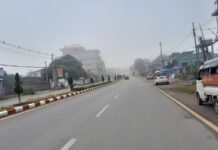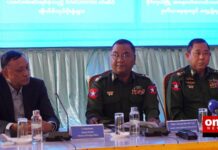 Hardly has the ink dried in signing the “Union Accord”, better known as “Pyidaungsu Accord” in Burmese, optimistic and as well pessimistic views started to surface in the media. And closely related to it is the linking of “non-secession” clause demanded by the government-military-parliament from the ethnic nationalities – 8 signatory Ethnic Armed Organizations (EAOs) and ethnic political parties – and the “rights of self-determination” for the non-Bamar ethnic groups, in the form of self-drawn and adopted constitution for each individual ethnic states.
Hardly has the ink dried in signing the “Union Accord”, better known as “Pyidaungsu Accord” in Burmese, optimistic and as well pessimistic views started to surface in the media. And closely related to it is the linking of “non-secession” clause demanded by the government-military-parliament from the ethnic nationalities – 8 signatory Ethnic Armed Organizations (EAOs) and ethnic political parties – and the “rights of self-determination” for the non-Bamar ethnic groups, in the form of self-drawn and adopted constitution for each individual ethnic states.
Let us first look at what the Union Accord has to offer and a bit closer.
Pyidaungsu Accord
37 agreements approved by the Union Peace Conference—21st Century Panglong (UPC-21CP) 2nd session were signed by group leaders and witnesses as a part of the Pyidaungsu Accord.
Part 1 of the Pyidaungsu Accord signed in this conference includes 12 agreements on political sector, 11 on economic sector, 4 on social sector and 10 on land and natural environment sector, altogether 37 agreements.
Going through the Pyidaungsu Accord and its four appendices, one would find almost not much to complain, as most are general terms that every stakeholders might have aimed for and could live with it. According to a keen observer: “To my understanding, the EAOs agreed to sign after the resolution that the khwe Ye twe Ye (secession and fusion) question would be reconsidered at the next UPC-21CP. All that left were almost universally accepted maxims, according to the observer, comparable to ‘The sun rises in the east and sets in the west’“.
Another urging came from the government’s side, who is friendly to the EAOs’ side, also urged the EAOs to sign it saying: “Please try to do something for her. She hasn’t made first sale of the day yet”.
She would have lost face, if she couldn’t show anything for all her efforts. But the Framework for Political Dialogue (FPD) and Terms of Reference (TOR) also specifies that there would be a signing of the points agreed at each session.
Still there was a real angst that the signing of Pyidaungsu Accord would not materialized, as Restoration Council of Shan State (RCSS) and Arakan Liberation Party (ALP) maintained that they would not sign the accord, as they were not allowed to conduct national discussion among their own people of Shan and Arakan respectively, as they were blocked by the government-military decision-makers. And thus the argument was: without inputs and consent from their own people they were not in a position to agree to anything.
The debacle was resolved by agreeing that only the group representative of EAOs, Kwe Htoo Win, would sign and not all 8 EAOs’ representatives. Likewise, U Thu Wai, representative for political parties, inked the first part of the Union Accord. But still the produced document lacks a solid consensus in a legal sense, so to speak.
Different interpretation on authenticity of Union Accord and secession issue
Apart from the authentic, or rather the full acceptance of the representative groups involving in the first Union Accord signing is now a controversial issue, as Shan Nationalities League for Democracy’s (SNLD) spokesperson Sai Leik came up recently, in VOA report of June 1, with a doubtful remark saying: “Within political parties cluster no agreement was reached. The time was spent quarreling with each other. It is questionable whether just one or two were asked to sign without common agreement among the political parties. If we are going to continue in this pattern, the future Nationwide Ceasefire Agreement (NCA) path would become less valuable, less trustworthy and see that the peace process could be jeopardized.”
State Counselor Office’s spokesperson Zaw Htay doesn’t seem to have the same opinion, as he wrote in his article titled, “Right of self-determination, commitment and bravery”, in DVB of May 31 that during the UPC-21CP, Union Peace Dialogue Joint Committee (UPDJC) members debated over federalism on non-secession and rights of self-determination issues, the cluster of government (government, parliament and Tatmadaw) and political parties cluster were all in ageement except only a few backing the 8 EAOs’ position.
According to him the EAOs only wanted to accept the non-secession clause with a conditional clause, which says “so long as equality, rights of self-determination are practiced there will be no secession”.
While there could be disagreement on what Zaw Htay said, particularly where the political parties cluster within the UPDJC, on the full acceptance of the first Union Accord, the non-secession demand of the government is loud and clear.
Zaw Htay closed and summed up his opinion piece stating three points. Firstly, for another convention there is still time of six months left and lots of discussions, negotiations need to be done. Secondly, (EAOs) guarantee non-secession and take (enjoy) rights of self-determination, the commitment (by the government) that would be still there. Thirdly, no need to be downhearted for the first political convention. The following convention would be able to achieve more solid basic principles.
Earlier in an interview with the news media he also said that in order to give the military a sort of guarantee the EAOs and the ethnic political parties should promised that they will not secede.
He pointed out that the military coup in 1962 is due to the belief of the military that federalism could bring dismemberment of the country. But failed to admit that this military undertaking in the form of military coup has been a failure that paved the way for a full blown ethnic rebellion, followed by more human rights violations and accompanying hatred that are still present and become the order of the day in many ethnic states.
On the government non-secession demand the SNLD made a press conference on June 1, at its headquarter, where Party spokesman Sai Nyunt Lwin said: “We never demand secession from the union. We are already there to cooperate,” adding, “this is to clearly dispel accusation and rumors that we are not demanding secession.”
All this come about as SNLD rejected the non-secession clause demanded by the government to be included in the Union Accord.
Sai Nyunt Lwin made his point by arguing that no such words that could hold back participation of the EAOs that are still negotiating and about to negotiate be used during this period, as this would discourage them from joining the peace conference.
“If we want to secede from the union, we only need to do one thing. We would disregard the treaty signed in 1947. Until we haven’t done that, it is normal as it used to be,” he stressed as a matter of fact.
Another SNLD party elder, Sai Leik filled in by saying, “To simplify more than this, if we don’t want peace and like to secede from the union, we won’t form political party and no reason to attend the convention.”
But the most hard-hitting response came from Sai Kyaw Nyunt, SNLD’s UPDJC representative. He said: “We didn’t even make use of our right (to establish our own independent state) and get into this (Union of Burma). Given such condition, do you people still want to prohibit us with non-secession clause?”
He stressed: “This is concerned with the dignity of establishment of the union. This has to do with our Shan dignity. By saying this, it is not meant to secede but the need to respect each others.”
What now?
The rejection of the EAOs conditional clause by the government could be countered by asking: “If the non-secession promise is not given by the ethnic nationalities, would there be no more federal union?”
Isn’t the government demand also a conditional clause?
It would be far more better to accept the fact that the 1948 Union of Burma is formed through voluntary participation of ethnic nationalities’ states, together with Burma Proper or Ministerial Burma. In other words, the components that formed the union in 1948 joined to establish a new country as independent, self-administered, separate political entities and no one has the right to dictate or take away their rights of self-determination, including the rights of secession.
After all, it is far more important and wiser move to build trust and mold better understanding, in the ongoing process of peace negotiation, rather than comes up with the blunt demand of eternal fusion and unity first, that has irked and bred more distrust of the government, which the ethnic people considered to be just a Bamar-dominated regime.











Leave a Comments